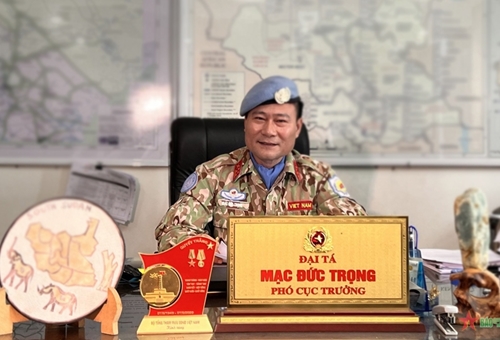Senior Colonel Mac Duc Trong had an interview with the press on the occasion of the 10th foundation of the VNDPKO (May 27, 2014 - 2024).
    |
 |
|
Deputy Director of the Vietnam Department of Peacekeeping Operations Senior Colonel Mac Duc Trong |
Talking about his feelings during his participation in U.N. peacekeeping operations, Sr. Col. Mac Duc Trong shared that he still clearly remembered his first activities, every place he went to and every person he met.
Witnessing ethnic conflicts and clashes between factions without boundaries, distinction between civilians, women or children, etc. was unforgettable things for anyone. Thanks to those experiences, he and other Vietnamese peacekeeping officers had a better understanding of the value and significance of the international duty that they have been performing.
Four years after fulfilling his missions as a liaison officer at the UNMISS, Col. Trong returned to the country and worked as the head of the delegation to survey and make preparations for the establishment of the first Level-2 field hospital of Vietnam in South Sudan. He had meetings with several old friends and colleagues and received enthusiastic support.
Later, when taking over the position of Chief of the Engineering Company Rotation 1 in Abyei, he received much respect from international friends, colleagues, and sentiments of the local authorities and people. They were precious “gifts” for him and his colleagues.
Mentioning the footprints during a decade of participation in U.N. peacekeeping missions, Col. Trong emphasized three important milestones: The deployment the first two military officers to UNMISS in 2014, the sending of the first Level-2 Field Hospital to UNMISS in 2018, and the deployment of the Engineering Unit Rotation 1 to Abyei in 2022.
Up to now, Vietnam has sent more than 800 officers to U.N. missions, including 114 individual officers, an impressive number. For individual commissions, Vietnam has achieved the highest level of outstanding officers’ performance of over 30 %, a high rate compared to the average of other countries participating in peacekeeping missions. This shows the professionalism, expertise, enthusiasm and responsibility of Vietnamese peacekeeping force during performing international duties.
In terms of unit types, Vietnam has successfully deployed a Level-2 field hospital and an engineering unit in challenging areas with insufficient infrastructure, while meeting the international standards required for professional and technical competence.
The deployment of the Engineering Unit Rotation 1 to Abyei with a force of 184 officers, along with a large amount of equipment, more than 2,200 tons of goods, including nearly 150 types of vehicles, within a month was a surprise at the United Nations Interim Security Force for Abyei (UNISFA).
“Deploying such a large number of personnel and equipment was a difficult task. At the UNISFA, many countries didn’t complete the deployment of a unit after two years of operation, with their equipment yet to arrive. In contrast, Vietnam completed its entire deployment within a month,” he said.
For the field hospital, despite the difficult conditions in South Sudan, Vietnam has obtained surprising outcomes. The Vietnamese field hospital can receive from 1,200 to 2,000 patients a year, instead of 200 to 300 patients like the previous hospitals.
For the Engineering Unit in Abyei, UNISFA's Acting Head of Mission and Force Commander Brigade General , U.N. Deputy Secretary-General, and other officials have all praised the unit for exceeding the U.N.'s expectations during their visits. Apart from completing its tasks and meeting all the U.N.'s requirements in difficult conditions, the unit conducted humanitarian work to improve the living standards of local people.
In order to upholding success in the participation in U.N. peacekeeping operations, Sr. Col. Mac Duc Trong underlined that the increasing expansion in numbers and fields of participation in U.N. peacekeeping operations is posing challenges in staff resources. Currently, the mechanism to recruit officers in the whole military to join the peacekeeping force is an effective measure.
However, the biggest obstacle is foreign language. Recruiting officers with both expertise and foreign language skills has remained a big challenge over the past 10 years.
The department has promoted the plan to expand positions of individuals and continued to look for new missions where Vietnam could deploy troops, with the goal of deploying at least 3 officers at a time at a mission, to create a collective that could support each other; among others.
Regarding the important goal of developing the VNDPKO into one of the leading peacekeeping training centers in the region, Col. Trong said that Vietnam has successfully held training courses using personnel returning from their missions.
The country has also implemented pre-deployment training at the unit level, which is challenging due to the comprehensive U.N. curriculum and training requirements. Achieving self-sufficiency in unit-level training is a crucial milestone for Vietnam, he said.
In terms of international training, over the past ten years, Vietnam has progressed from having no experience and relying on foreign instructors, to co-teaching with international and domestic instructors and now organizing high-level specialized training courses.
It can be said that Vietnam's path to becoming a regional and international peacekeeping training center has achieved good results. Vietnam has been doing well to achieve that goal; building courses with international participation; bringing Vietnam's experience to the international stage. That is the right path and Sr. Col. Mac Duc Trong strongly believed that Vietnam would reach the goal in a short time.
Translated by Quynh Oanh